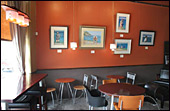WiFi is the open source technology of the decade


Without it, I wouldn't be posting this.
Since a lightning strike knocked out my wired Internet service a few nights ago I have been coming to you from inside a coffee shop a mile from home called Gathering Grounds. (Last evening, by the way, I posted from a nice little bar called the U-Joint.)
The morning rush is over, and two cops chit-chat near the window while I work at a well-lit desk in the back. The network comes on automatically, as my PC boots up, and the signal is as strong as the caffe mocha beside me.
There are thousands of shops like this around the U.S., quiet little cubbyholes which also serve as remote offices for telecommuters. Efforts by bookstores and coffee chains to charge for network access have been less successful, and why not? I'm paying $4/hour -- that's what my mocha costs, with tax.
This fact illustrates an important point about open source business models. They don't look straightforward, but they work. I buy coffee for a desk and some network time. My presence helps attract casual drinkers to the shop during slack periods -- the place is never empty.
While WiFi speeds have increased by a factor of 10 in this decade, thanks to technology, the frequency space available to it has not increased at all. Instead, the government persists in "auctioning" spectrum to cellular companies, who hoard it and sell bandwidth through an eye-dropper.
It works for them, because consumers who want truly mobile phone service (increasingly, any service at all) have few choices.
This, too, illustrates an important point. Proprietary models mainly benefit the proprietors. They are inherently political -- anyone who thinks the FCC is a non-political body is drinking something much stronger than a caffe mocha (with whipped cream and chocolate sauce).
We can choose the proprietary model, with its slow speeds, lack of competition and high prices. Or we can choose the open source model, expanding the unlicensed spectrum, creating competition through equipment and service.
Your choice. Me, I'm having another mocha.